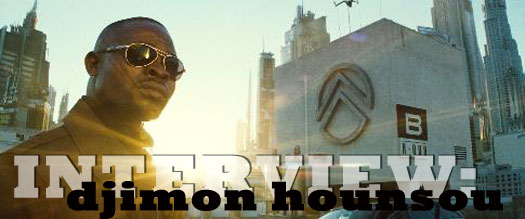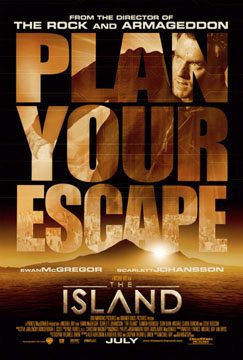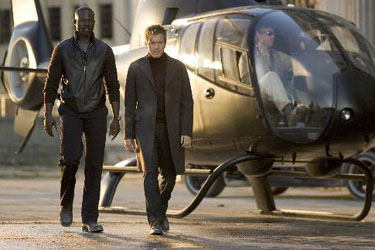
Djimon Hounsou is awesome. For many it was his rich and haunting role in Spielberg’s slave ship epic Amistad and for others it was his work in In America that showcased an actor who is in a class all his own, Biker Boyz notwithstanding. For me it was Deep Rising that first showcased the man, and though his axe assisted murder isn’t probably his shining moment ("Moneymoneymoneymo WHACK!), it still worked for me. Then there’s Gladiator, where among other things, he buried the action figures of Maximus’ family. In Constantine, he put Keanu Reeves in an electric chair, something critics have tried since Chain Reaction.
Seriously, though, Hounsou is an amazing actor and a performer with uncanny presence in films. He’s one of those people that rise to or beyond the level of the material and one who will long thrive thanks to his talent and as revealed here, his realistic and wise views on his profession. Without further ado, fresh from his press tour for Michael Bay’s The Island (opening Friday), Djimon Hounsou:
Nick Nunziata: There’s a whole mystique about
Djimon
Hounsou: It’s a good mystique.
Nick Nunziata: What is it really like working with the guy?
Djimon
Hounsou: It’s fun. It’s energizing. Certainly when you’re doing an action
picture the last thing you want is for a set to be boring. He’s the center in
the entertainment factor on the set. If you don’t take anything personal, he’s
great to work with.
Nick Nunziata: Just the right amount of insanity?
Djimon
Hounsou: Yes.
 Other Interviewer: I’d love to
Other Interviewer: I’d love to
know the Djimon Hounsou road from Janet Jackson videos to working with
Djimon
Hounsou: It’s been a little mind blowing for me, sometimes I have to look back
and see how far I traveled. Coming from Africa and leaving Africa at the age of
12 and moving to Europe and then finally coming to
dream. It wasn’t without challenge but it’s been fun and I look for working
with bigger directors and doing bigger things. I mean, you don’t get bigger
than Steven Spielberg, Ridley Scott, and
Other Interviewer: Why was there a
move?
Djimon
Hounsou: You have to understand one thing, I was born in a French colony and
it’s the drive for all Africans to see outside. Some of our leaders, such a
corrupt government and it’s difficult for anyone to blossom. Also, we were
colonized by the French and you want your kids to kids to be educated by the
best and from the best schools and that was one of the reasons I was sent to
Other Interviewer: The summer is
usually the time for dumbed down movies, but there’s more depth [in The Island] than you’d think.
Djimon
Hounsou: Good. So much more. It’s the first time I think the audience will be
surprised how great a storyteller
difficult to shoot an action picture where the story has any arc and depth.
That in itself is difficult to do and he did a great job here.
Other Interviewer: It’s a
marketing challenge to not give away all the components of the story.
Djimon
Hounsou: The premise will still intrigue people. The fact that today, when you
see what extent people are going to completely alter their physical being, it’s
somewhat the nature of our story that the rich and famous in the mid 21st
century are starting to have the luxury to [make strides towards] having
themselves cloned. It’s a weird topic for the simple reason because some
countries have banned the research of stem cells.
Nick Nunziata: The
Island travels some hallowed ground in terms of science fiction and it’s
definitely new terrain for Bay. You play a gray character. Was there a
different approach to take this time around?
Djimon
Hounsou: The only approach here, you’re shooting with
doing some action. You’d better be physically fit. The only preparations was to
be briefed on [these mercenary types], what they do and with a matter of fact
attitude. How they go about killing people. I don’t know if you’ve heard of
economic hitmen who generally come from powerful countries who are generally
mercenaries who go to different parts of the world and impose a certain regime
or system there. If the current president isn’t following their direction they
get rid of them accidentally. Nicely. One of those accidents you hear about,
car crashes or whatever. You’d be surprised to know. It was nice to hear it
firsthand from those guys how they operate and keep the accuracy.
Other Interviewer: Is it your
desire to play a variety of roles?
Djimon
Hounsou: Absolutely. The industry tends to want to pigeonhole us. For a black
man it’s so much more difficult to prove you can be more than… Anyways. You
know where I’m going.
Other Interviewer: Last thing I
saw you in was Beauty Shop, which was
quite different.
Djimon
Hounsou: Quite different, but I like the luxury of going back and forth between
indie films and blockbusters. It’s a great luxury and for an audience it’s
important, because a film like this feeds you, it’s where you get your bread
film.
Other Interviewer: What others
roles do you look for in the future?
Djimon
Hounsou: I don’t have a specific role that I want to play in the future apart
from that I always want to play roles that have great integrity as men and as
black men. I don’t want to be portraying men in a way that puts down black men,
but overall I’m looking for great stories. It’s all about that. Great stories
and great characters.
 Other Interviewer: What do you
Other Interviewer: What do you
think it was about Amistad that made
you so powerful and memorable?
Djimon
Hounsou: I don’t know, but the first thing I would say has to do with the
story. This is a story about African American history in
was a great luxury to have someone of Steven Spielberg’s caliber to direct. We
needed to draw strong attention to the project and the fact he was championing
it was perfect.
Other Interviewer: But you’re the
one everyone remembers.
Djimon
Hounsou: Of course. I worked on it hard. It was all I was breathing for that
four or five months. It was all I thought about and dreamt of day in and out,
literally because I was speaking a language that was foreign to me so I was
going to bed with a tape recorder in head all the time to get the language
right and not necessarily fake it.
Other Interviewer: In the news,
the G8
on in
Djimon
Hounsou: When you say
you kind of put it on everyone’s shoulder to do something. I don’t think that
was the approach. Certainly there was a group of celebrities from the film
world and the music world who came together and wanted to do something, but I
wouldn’t say
I would say that some of us have supported and championed this movement that
happens to be the biggest movement in the history of
Period. Africa has never been on the map of the world like that before and for
the leaders of the developed world to make trade fair in and out of Africa,
100% debt cancellation and the extreme poverty in
All of that was the goal of the G8 Summit but for a continent that used to be a
cradle of life but turned out to be a cradle of death, we can’t just sit around
and enjoy our life in the West and see people die on a daily basis of treatable
disease. The West has something to do with the corruption there as well, because
you put people in power that can somewhat favor your business or whatever and
it’s unfair. If you’re giving money to a country you’ve got to watch where the
money is going. If you allow and can tolerate those leaders who turn around and
put the money into European bank accounts, it’s benefiting the West, not the
continent. No money stays there, but we have so many resources we can
cultivate. We need to cultivate to be able to trade them.
Nick Nunziata: The consistent thing in all of your roles is
an incredible amount of presence. I’d like to know a little about your acting
background but more importantly, what is it about these roles that enable you
to make them your own? It’s not something that can be taught.
Djimon
Hounsou: You’re right about that but without saying so much about myself I
think I have an idea where you’re going with this. Because we are the
instrument of the roles we play, so much of our own personality reflects in
those roles. Maybe it has something to do with the way I carry myself around
and I’ve been blessed to have been born in the continent of Africa and then
went to
European life and come to
the best country in the world.
Nick Nunziata: It seems like you’re a leading man playing
character roles and I’m waiting for that to change.
Djimon
Hounsou: Same here! I’m waiting. I’ve been working on it.
Nick Nunziata: There are people who are content to be the
character actor.
Djimon
Hounsou: No, I want to be able to carry my own film and I created a production
company and have been developing my own projects. I must tell you, I have a
great group of writers and people in the industry who are very smart. I want to
create things that really brings the world that I’ve experienced and what
really goes on in this world because sometimes
it really doesn’t need to go into the outside world. I want to bring that.
Other Interviewer: Are you
creating that next great story?
Djimon
Hounsou: I am developing a couple of projects with a great writer, Eric Olsen
who’s writing for Jerry Bruckheimer’s show. A very talented writer and soon to
be a great director.
Other Interviewer: Do plan to
direct?
Djimon
Hounsou: Me personally, no. I don’t like the headache. I don’t mind putting a
deal together, I don’t want to be telling people what to do. As nice as I… I
tend to have a temper.
Other Interviewer: All the women
responded loudly to your shirtless scene in Beauty Shop. Do you get that a lot?
Djimon
Hounsou: Yeah, I’m realizing that I’ve been hearing it. I don’t look at myself
that way, but…
Other Interviewer: It doesn’t take
away from the fact you’re a very good actor.
Djimon
Hounsou: I hope not. That’s why you must always not be analytical about
stories, not be worried about how great you look. Just worry about the story
you’re telling.
Nick Nunziata: It doesn’t hurt to
look good too.
Djimon
Hounsou: It’s good to look good. When you meet a girl that’s beautiful but acts
like she knows she’s beautiful it takes it away. I don’t want to talk or deal
with her. It’s the same mindset you have to deal with at work and not walk
around doing scenes where you act like you’re “all the shit”. Stay real.
Other Interviewer: What was your
reaction to the Oscar nomination [for In
America]? Caught off guard?
Djimon
Hounsou: Believe me. Of course it caught me off guard, we were all blown away
because at the time the studio wasn’t pushing the film and we wanted the film
to get theaters and get people to see it so we could generate some money. That’s
what the drive was. Then the Golden Globe nomination came and it didn’t phase
anyone and certainly nothing happened. We were like “cool!”. Then the Oscar
nomination came and everyone was nicely surprised.
Other Interviewer: It’s one of my
favorite movies of all time. Such a personal movie for everyone involved. Not
about making 100 million, just a great story and characters.
Djimon
Hounsou: It was quite demanding. The emotional content, so disturbing and
beautiful.
Other Interviewer: I remember
seeing it in a crowded theater, everyone was bawling, especially at the end.
Djimon
Hounsou: That’s what you want to accomplish, to get to people emotionally.
 Other Interviewer: Will Smith had Hitch as a hit, Tim Story directed Fantastic Four and it’s doing really
Other Interviewer: Will Smith had Hitch as a hit, Tim Story directed Fantastic Four and it’s doing really
well. Black people are certainly capable of carrying movies. From your
perspective, what is it going to take for more people in
Djimon
Hounsou: It’s not a lack of understanding. I think they understand it. I think
it’s also for us as African Americans to really know how to embrace it. It’s all
about the story, if you don’t have a great story you’re pretty much doomed.
Certainly for a black man, if you don’t have a story and the right packaging,
surrounding, the right people to embrace the package and embrace you, you’re
also doomed. If you watch completely comedians do well, but when you see them
do well you look at the make-up of the film you’ll see they’re well surrounded.
That brings up the value of the film from every aspect. If you do it the right
way and have a great story, you’ll be successful. It’s a product. A matter of
packing it the right way.
Nick Nunziata: It’s very
frustrating.
Djimon
Hounsou: It is frustrating, believe me. We’re not giving the luxury and the
chance. As black people, we are limited. We don’t have the luxury of fucking up
too many times. You fuck up one and that’s pretty much it. For a Caucasian in
the film world we have seen various actors not do well and really bomb movie
after movie and given millions and millions of dollars to make movies.
Nick Nunziata: It’s weird how the
cycle goes. In the early 90’s if you were a black filmmaker and you made a
gangster film you’d be accepted, then it was where a Soul Food or something else like that in the middle of the road or
with a comedian attached. It’s never just filmmaking. Spike Lee and John
Singleton are exceptions. Have you seen firsthand how the more independent
voices are crushed?
Djimon
Hounsou: I know exactly how. I see how they do it right and firsthand where
some of us make mistakes. It’s feasible. We all know it. But are we equal?
Nick Nunziata: But it seems hard
to exist within the
Djimon
Hounsou: You have to venture outside and if you do well, they embrace you.
Other Interviewer: What actors do
you admire in your craft?
A weird noise happens.
Djimon
Hounsou: What was that?
Other Interviewer: Is someone
trying to get in?
Nick Nunziata: It’s a haunted
room, that’s all.
Djimon
Hounsou: You can’t help but admire Denzel. He has transcended colors. One of my
idols. Morgan Freeman, obviously everyone’s idol was Sidney Poitier. We have
some very talented actors there. We kind of feed off each other, the younger
generation.
Other Interviewer: Can you add
anything to the Gladiator rumors?
Djimon
Hounsou: There is something to it, just a matter of having the studio
greenlight the story and they’re waiting to have a great story.
Nick Nunziata: That new DVD on the
way will certainly stoke the fire. Papa Midnite was a small role but a really
strong one. Is there any depth to the
sequel rumor?
Djimon
Hounsou: I haven’t heard, but everything’s a rumor until you sign your
contract.
Other Interviewer: What made you
decide on acting over another career?
Djimon
Hounsou: Probably because I was really shy when I was growing up and it was the
way to get out of my own skin.
Other Interviewer: When reading a
script, how do you make it your own?
Djimon
Hounsou: Most of the work has to be done at home. I read, read, over and over
again and fantasize about it. It’s like when you watch a movie the first time.
You watch it for the whole picture, and the second time it’s always better. You
get a little more depth of the story and of the character. The more you read,
the more you sink in.
Nick Nunziata: What have you
learned from Spielberg, Scott, and Bay?
Djimon
Hounsou: I have learned a great deal from Steven Spielberg given that it was my
first big and leading role to this day. But even the same director is different
from film to film because the subject matter is different that the one before.
I like to think that in itself makes all directors slightly different because
they have different approaches story to story.
if you give him a story with great depth he’s going to turn out as the best
storyteller as well. The one thing that I see through all of them is that they
have a great sensibility to allow the actor somewhat come with his own
understanding of the story and let them exploit that first and then have the
little touch to guide you in the process of it. You want to give it all you
have and they’re there to guide and tone you. It’s like that music, like a jazz
thing.
Nick Nunziata: It seems like if
there’s a crash course in learning the business it’d be those guys.
Djimon
Hounsou: Definitely.